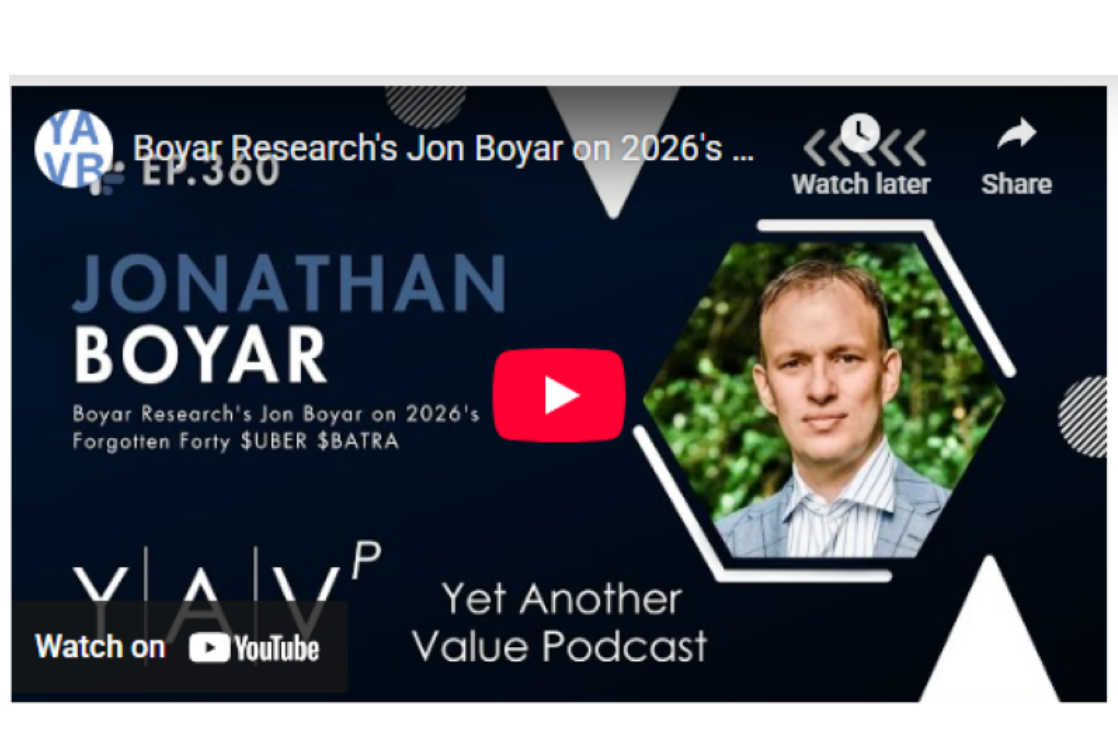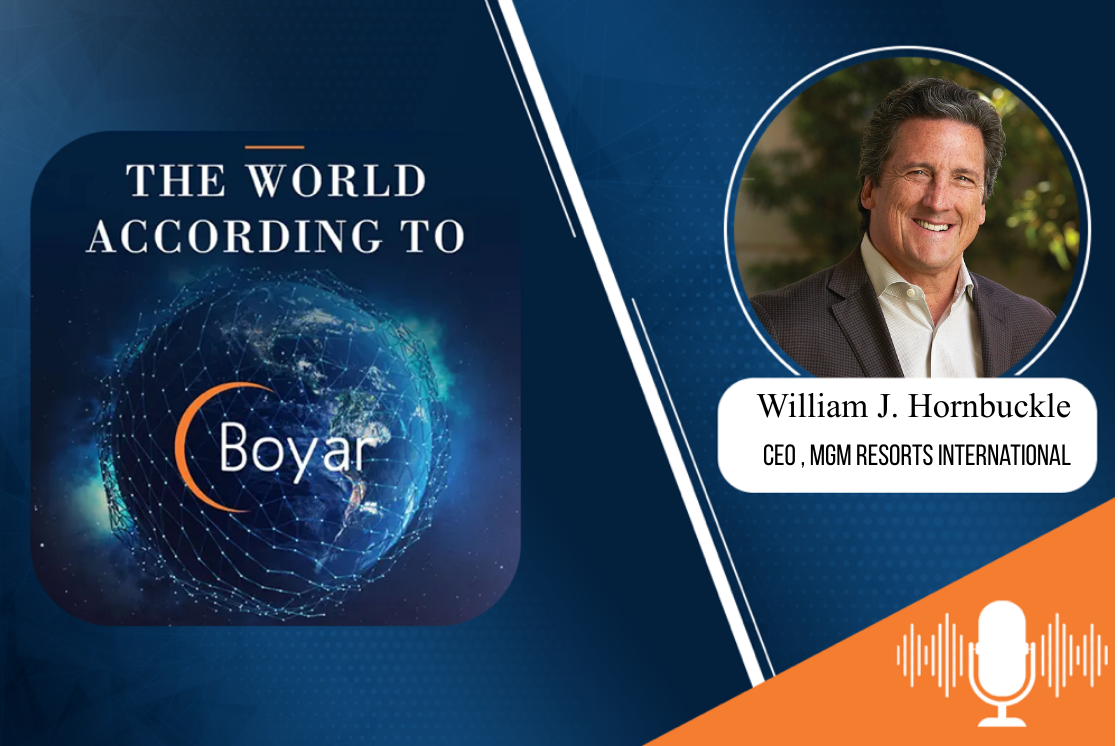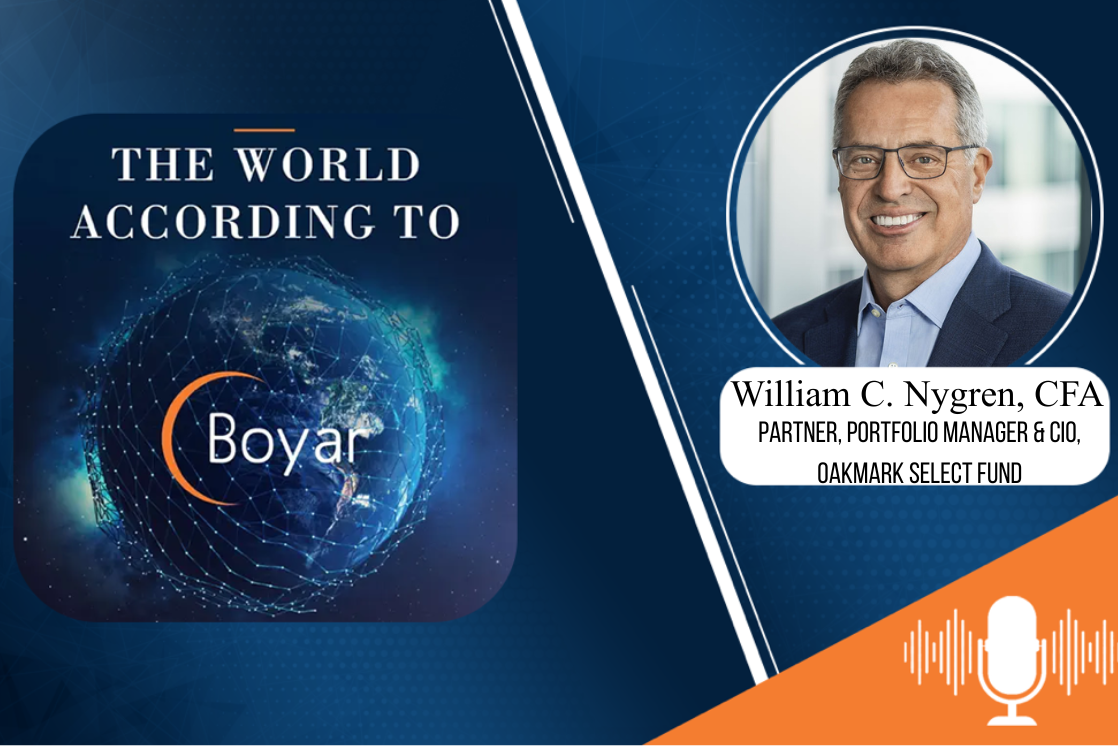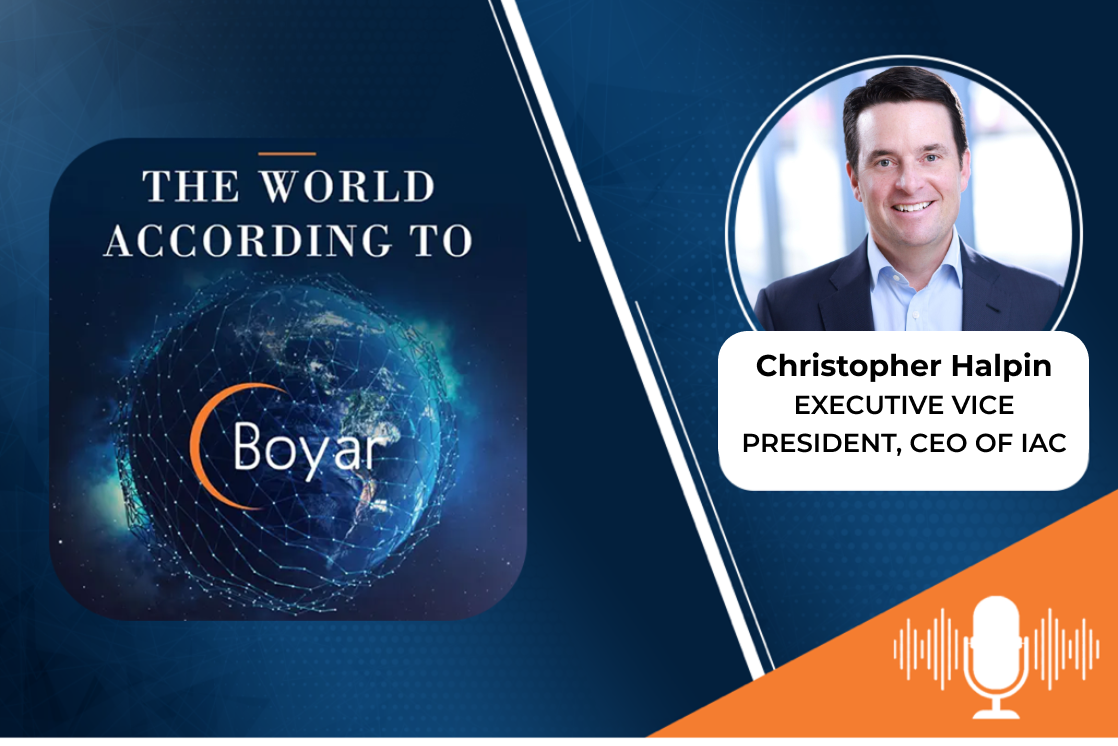Jonathan Boyar on The Virtual Value Investing Q&A Speaker Series at Brown University
In a recent edition of The Virtual Value Investing Q&A Speaker Series at Brown University (where previous guests have included Howard Marks, Wally Weitz, and Arnold Van Den Berg) Jonathan Boyar discuses:
- Our stock selection method(s)
- Two of Boyar Asset Management’s largest positions: Home Depot and Microsoft and the importance of holding stocks for long periods of time
- His views on the current media landscape
- His thoughts on Uber, IAC, and ANGI
- How Boyar is investing in the cannabis industry
- His thoughts on portfolio diversification
- And much more…
To listen to the interview in its entirety, please click here.
Click Here to Read the Interview Transcript
[00:00:00]
[silence]Interviewer: 0:03 We’re absolutely glad to have Jonathan Boyar here with us today. Jonathan Boyar is president of BIVR, an independent research boutique established in 1975 that counts some of the world’s largest sovereign funds, hedge funds, mutual funds and family wealth offices as subscribers.
0:21 He is also principal of the Boyar investment management which has been managing money utilizing a value-added strategy since 1983.
0:26 He has been interviewed in Barron’s, Welling on Wall Street and Guru Focus. He spoke at the 2017 London Value Investor Conference, the 2017 Guru Focus Value Conference and the 2017 International Value Investing Conference. He is also a contributor to the latest edition of Harriman’s Book of Investing Rules of the do’s and don’ts of the world’s best investors. He is a senior contributor to Forbes as well as the host of the World According to Boyar podcast.
0:50 Thank you for joining us today Mr. Boyar
Jonathan Boyar: 0:52: Thank you for having me today it’s an honor to speak for your organization, and I’m happy to just chat and I look forward to getting some great questions later. I first thought I’d start by just telling you who we are, what we do and how we come up with stocks for four clients. We’ve been doing this for quite some time and the slide up here says unlocking value since 1983 that’s somewhat true.
1:27 We actually started as a research boutique; my father started the business in 1975
to sell independent research to hedge funds, mutual funds, family offices, that type of thing utilizing what we like to call a business person’s approach to stock market investing and then in 1983 we established four-year asset management where we manage money for family offices, high net worth individuals and institutions.1:58 I’m not sure why the slide’s not working but here, let’s do it this way.
2:09 Here’s a disclaimer. You have that.
2:15 So first, I thought I talked a little bit about what we do. We’re very different than your traditional value investors and, I’ll talk about value investing in general, a couple slides from now, but what we do is we take every company whether it’s Walt Disney, Microsoft, any big, huge company or a tiny 2:39 one like Town Square Media and we look at it through the lens of an acquirer and we say or what we try to do is we can buy it at a significant discount to what we think it’s wort.
2:56 That’s something we will consider, that’s the first, you know first criteria it has to meet and then the second criteria is it has to have a 3:08 catalyst. I have to have a reason for the stock to go up over a reasonable period of time and we’re much more patient than most people. You know, Barron’s once called my father the world’s most patient investor.
3:20 We look at catalyst that could take two or three years to unfold. We don’t mind waiting that long because patience is generally rewarded.3:34 I love this quote and I think it’s as true as when Sir John Templeton was investing as it is today: “I think that you can’t be afraid to be different.” If you’re buying the same stocks as everyone else is as Sir John says you’ll get the same results so what you want to do 3:57 is find stock that you believe in that are believed to be intrinsically undervalued, stocks that you want to own for long periods of time to allow the magic of tax-free compounding to work.
4:17 So personally I dislike the term value investing. I think it’s a term that’s really kind of used by consultants and other institutions to try and style box people, put everyone in a neat little corner.
4:36 I like to say I don’t think any growth investor wants to overpay for a stock
4:41 So, value investor is the same thing. There are lots of different schools of value investing and some people like to buy traditional value stocks where mediocre businesses that are just very very cheap and that’s really the deep value camp and that’s something we rarely do anymore. It worked really well when my father started the business in the 70s and in the 80s when having a calculator was a kind of a big advantage and a big technological thing. It doesn’t really work as well anymore.
5:28 If you’re doing deep value investing, you’re going to end up probably with a lot of broken retailers.
5:34 There’s special situation investing where there’s an event that’s going to occur that you think you can analyze better than others. There are asset plays like Madison Square Garden that own extremely, that don’t look statistically cheap but if you sum up the value of all the assets they have, the stock price significantly discounts that value.
5:58 So there’s lots of different ways to approach value investing and what we like to do is we like to invest in in high quality businesses selling at a significant discount to
what an acquirer pays and has a catalyst for capital appreciation.6:17 Having that high to medium good business is critically important.
6:23 We don’t want to rent stocks we want to own them, we want to own them for
very, very long periods of time.6:35 If I look at where we have made the most money, probably our two largest positions are Home Depot and Microsoft where I think we bought them starting in2006 and 2007 and sold very little of it and they’ve come to become outsized positions. I think it cost us then30 dollars a share and now they’re significantly better than that. And when we bought them, they were good businesses. We could never imagine that they would have compounded the way they have and 7:14 Microsoft would have the renaissance that it did, but we knew we were buying a high-quality business and we kind of just let stuck along for the ride.
7:27 One of the things I like to tell people is doing nothing is an action. You don’t need to be turning your portfolio over every day. If you do that, you’re gonna miss the jump from in Home Depot from $30 to $300 and change and you’re gonna be paying taxes
along the way.7:50 Just briefly gonna talk about our investment process. We look at how much cash flow a company can generate, we like to look at recent comparable transactions that’s extremely important to us as they’re the best judge of a business value.
8:09 To us, the most important thing is protecting the downside, the upside takes care of itself. We want to buy businesses where we have the chance to make a fair amount of money but most importantly not lose a lot of money so that’s something that’s critically important to us.
8:34 It’s also to have that. Buffett and Hunger call a circle of confidence. There are things that we like to invest in and they’re things that we don’t.
8:48 We like the businesses, a lot of consumer-oriented businesses, media businesses things that you can touch, feel, analyze, and really understand. We don’t like commodity-oriented businesses and over a long period of time that has helped us. And the thesis behind not wanting to own a commodity-oriented business-like oil and gas company or something to that effect is your whole thesis or a large part of it is predicated on the price of oil which is out of your control, and I have no idea how to value what oil is and where it’s going. So, if I’m looking at buying an entire business which is what I do when I buy individual stocks and looking at it if I’m buying the whole company, I wouldn’t want to own a business that is solely dependent or largely dependent on a commodity price that is outside of our control.
9:54 Over the long run that’s helped us. 2019 it was great when oil stocks and energy stocks did terrible. 20 or 21 we suffered and so far, it’s March 3rd we’re suffering this year, but I think over the long run it’s the right thing to do
10:17 We have lots of different approaches. We look for stocks as I said we like looking for hidden values, hidden assets that are not properly reflected on the balance sheet. We like looking at the 10:34 franchise approach rate, consumer franchises especially when they’re masked by a corporate name. That’s actually a really great way to find value.
10:47 If I told if I asked most people and I actually did this when I was on a trip when we were actually allowed to travel, do you know what Acushnet was? No one really knew what it was, and these were sophisticated investors and I said, well they own Titleist
golf balls and golf gloves and other really great brands and that’s actually it stops people from looking at it and they see Acushnet, what’s this and they go on to the next thing. So, it’s actually a great way to find value.11:28 We love when an industry falls out of favor and that can happen really quickly
You’re seeing so far, the early signs of it with the technology share so far this year.
How low that goes is anyone’s guess but when an industry comes out of favor, they throw the baby out with the bath water and we try to find the best of breeds, the ones that are going to survive and thrive over the long run and that’s been a successful approach for us over time.12:04 You look at things like capital allocation, decisions financial strength and again prices for what other companies have been acquired in the recent past is critically important.
12:21 Hidden asset approach is also something that’s great and that we love and one of the reasons that we love it is no computer screen in the world or artificial intelligence
is going to tell you that something’s not valuable. Something that’s valuable is not reflected on the balance sheet and I’ll just give you a very quick example. Madison Square Garden has been a holding of ours for a long period of time and we’ve had a decent amount of success with it.12:57 When we first started analyzing it Wall Street assigned zero value to the air development rights where you can actually sell your pair to neighbors but what we saw was the real estate that was located near Penn Station. That’s equal to the enterprise value of the entire company, so essentially at that price you were buying Madison Square Garde’s business for zero costs. So, a lot of times because of accounting rules and things like that great assets are obscured.
13:34 The classic example I gave you, my father told me one of the first stocks he ever
looked at was Tiffany and company and at the time you could have bought the whole
company for 24 million dollars in 1975. The building it owned on 57th street and in fifth avenue which wasn’t reflected on the balance sheet was worth more than the entire
market cap of the company. So, you’re getting the Tiffany name, all the jewelry etc. for free. These things still work, and it still happens you just have to be patient and pick your spots.14:11 I talk about you know consumer franchises before, we also like fallen angels, we love looking at the one starlings of Wall Street or that are now unwanted, unloved.
What’s critically important is not falling into a value trap. You have to look at the reason why the stock has gone down and look if there’s a long-term business there that’s not in secular decline and that’s obviously a business judgment that you have to make and that’s something that you get with time.14:56 We also look at spin-offs that’s a fruitful area to define things. That’s been pretty well documented.
15:08 We also sometime look at companies emerging from bankruptcy so it’s just basically we’ll look anywhere there’s value that we can understand, and you know I’ll just say one more time: being inexpensive stock is only halfway there. You need to have that catalyst otherwise you have a significant danger of falling into a value trap which is one of the biggest problems that investors fall into.15:40 I promised I would be brief, and I think this was about 18 minutes or so. if you have any questions, feel free to contact me. I’d also encourage you; I have a podcast called The World According to Boyar. That’s available anywhere. We
have really interesting guests, that’s a good way to get some business lessons and you can sign up for everything if you go to boyarvaluegroup.com. Thank you for your time.Interviewer: 16:14 Thank you so much, that was a really excellent presentation and I’ll send you the questions.
16:19 Our first question is how do you see the media streaming space going forward?Jonathan Boyar: 16:25 The media industry obviously is undergoing a tremendous amount of change and you’re trying to find the winners is very difficult.There’s a lot of smart people chasing this. You know, there’s an old adage: content is king and to me the ones with the best content are the ones that are gonna win and looking at a company like Disney they’re gonna be winners. They’ve already I think have 130 million subscribers to Disney plus. They’ve priced it competitively they still haven’t rolled it out to the rest of the world. I see them being big winners.
17:07 We really like the AT&T deal with Discovery. That’s going to happen early in this sometime in the second quarter. It looks like that’s where it will uh occur and you’re marrying lots of different type of content. It’s a lot of overlap, not a lot of overlap so there’s a lot of synergies there so I think these it’s going to be a game of scale and there are these things called free radicals. Companies like that that John Malone calls free radicals like AMCX and others that’ll probably be gobbled up so it’s gonna be a very interesting space to monitor over the next couple of years. I think there’s a lot of value there you have to be patient. It’ll be very interesting to see what happens when Discovery and AT&T consummate the merger. There’s going to be AT&T shareholders are going to be given Discovery stock and most are a lot of their shareholder base is retail. We probably don’t want to own a levered media company so is there going to be a lot of force selling. I don’t know it’s probably been the most telegraphed thing I’ve seen in a long time. So it’s quite an interesting space to be in.
Interviewer:18:28 Absolutely and let me ask you another question about the sectors. One of the players that you have right now is Apple TV and I think you know the
marketing cap and the size of the company compared to some of these other players is much much much larger um and they have quite a lot of uh quite a large cash balance but they’ve been going more through an organic raptor they’ve been developing their own content. Do you think we will see them go more and then we’re gonna graft at some point and buy one of these other major players?Jonathan Boyar: 18:54 I wouldn’t rule anything out. I don’t know, I mean it’s interesting. They said if you know Steve Jobs had lived they would have probably bought Disney. Now Disney’s too big and it made a lot of sense for a lot of reasons. I think it would make sense for Apple. You know it’s very difficult to replicate, to create original content. These production studios cetera cost a lot of money it would make sense for them to buy something. I mean they have a lot of other issues that they have to contend with they have government regulations you have to contend with, so I don’t know.
It’s always puzzled me why they haven’t done that and what their real true intentions are, but you know time will tell.Interviewer: 19:48: Can you speak about your thesis on UBER and I mean do you have any sort of forecast for when you think they will reach profitability?
Jonathan Boyar:19:53 Over the next couple of years they should. I think UBER is extremely undervalued. I think it’s a terrific re reopening play and what we really like about UBER is the competitive advantage. I mean they literally spent billions and billions of dollars to have this network. It reminds me in some ways a PayPal. Five, six, seven years ago or what not where it didn’t get the respect it deserved from the from this from Wall Street and this network is extremely valuable. Some people like to complain about UBER and drivers aren’t happy, that passengers aren’t happy. Bottom line is people are using them and demand is picking up and I think with the reopening
I think the rides business is going to really surprise. On the on the upside, the CEO, they have a great CEO, former IAC Expedia guy, just bought 10 million dollars’ worth of stock. It’s a name that we like it’s not in your traditional value camp but it has things that we think are of value which is that network.Interviewer: 21:14 And so you think them reaching profitability will be more related to revenue growth and economies of scale or do you think it’s going to be more related to them having such a large market share just being able to jack up the pricing of rides?
Jonathan Boyar: 21:25 I think the more of the first and then in the second I mean they were subsidizing a lot more rides in the in the beginning than they are or now. I just think it’s the economies at scale. They’re going to be, listen, Disney’s great at this too with their new um park system where they’re able to maximize revenue. It’s great to be able to do that but you also do want to keep your customers happy to some degree.
Interviewer: That makes sense and can you please speak about your thesis for ANGI home services as well?
Jonathan Boyar: 22:02 In terms of ANGI it’s more looking at IAC in general which owns 85 of ANGI home services so essentially if you’re buying IAC you’re also making a bet on ANGI that’s probably a better risk reward way of doing it.
22:17 ANGI’s a great business and they’re pivoting in a really unique way. They want to you know the company is controlled by Barry Diller who’s been this type of person you want to invest alongside with he’s had returns that were you know compounding at 15 a year since 1995 or so.
22:42 He’s been very shareholder friendly and what he’s really good at doing is taking
offline businesses that traditionally were done in person. Ticketmaster for example, Expedia, online dating, all of these things that I for you you’re a little younger you’ve grown up with this online your whole life, but it hasn’t obviously always been that way and they’re really good at that making that transition and they’re looking at making that transition to for home services which is a huge total addressable market and they want to be kind of the one-stop shop where they have something called ANGI services where let’s say you needed your gutters clean you go on your phone, you say what the job is and then basically they say okay they’ll cost sixty dollars whatever it is someone will be there um in two days. And they take care of everything and that’s what they’re trying to do it’s a very very difficult thing it’s it’s hard to do but if anyone can do it’s Barry Diller and his team there so they’re making that transition which is just quite difficult to do but it’s faith in the management team, it seems like they’re making the right progress um you know. Probably shouldn’t be a public company probably should be part of IAC as it was growing but I think IAC with owning matched uh I’m sorry owningcare.com having a 27 stake in Turo which is about to go public having a whole host of other valuable businesses: Dotdash Meredith. They just bought Meredith late last year it’s it’s a really great hodgepodge of businesses that makes a lot of sense.Interviewer: 24:50 I spoke about Tesla in the past. How do you see Tesla today both from let’s say evaluation perspective but also from a business perspective? Let’s say, do you think in 10 years Tesla world you know have maybe a similar market share in the spaces they have today or do you think they’re going to really be competed away by some of these legacy players or some other Startups?
Jonathan Boyar: 25:09 Listen, I I’ve been the wrong person to listen to when it comes to Tesla. I don’t understand as a value person how it’s afforded such a high multiple.
I know people say it’s more than a car company, I get that thesis I just don’t necessarily believe it. I think that they’re in for a rude awakening when GM you know they’re coming out with a whole host of great other cars there’s going to be other competition with Ford. I mean it’s a very very difficult space and traditionally hasn’t been the best business to be in so not really sure why because it’s electric. I realized there it’s a little bit different but it’s to me at these levels it makes no sense.26:02 Wouldn’t bet against it I think Elon Musk, I admire what he’s done and what he’s accomplished some of the ways he’s done I questioned but, he is certainly a controversial person, but he’s revolutionized an industry. But will he be the ultimate winner?
26:25 And even if he is you know should it be uh top 10 S&P 500 companies. I think it’s worth more than Berkshire Hathaway or roughly. I don’t have a marked caps in front of me but if someone said John for your birthday, I’m either going to give you Tesla or I’m going to give you Berkshire Hathaway. You get Geico you get a huge steak and Apple and Bank of America, you get all these wonderful businesses, I’ll choose Berkshire.
Interviewer: 26:58 It makes sense. Also, you have some at least one investment that’s related to the cannabis industry maybe. Speak a little bit about that and how you view the cannabis industry today.
Jonathan Boyar: 27:13 You know we’re valued investors and as I mentioned before margin of safety downside protection is extremely important to us. We kind of got into the cannabis business by happenstance. We own a company called Scott’s Miracle Gro. James Hagedorn was a guest on my podcast and certainly a very interesting fellow.
27:36 He’s done a great job and they’re in the home and garden space you know anyone who gardens and even if you don’t garden you know what Scott’s is. They’re by far, they’re Coca-Cola like market share in what they do.
27:53They’re sold at Home Depot, Lowe’s, their pricing power, they’ve raised prices three times in the past year. About 10 years ago or so they 28:05 decided to get into the cannabis space but to do it in a different legal way. So, they’re kind of it’s a pick and shovel like during a gold rush event where or situation where they are providing lighting and filtration and all the other anything that a grower would need. And they are by far number one in in their field on this. It’s a billion-dollar business growing rapidly. The stock was $254 in April of 2021 it’s currently $140. And if you chart uh Scott’s Miracle Gro next to a cannabis ETF it looks very similar it’s not solely gone down because the
cannabis business is down in the dumps uh temporarily but it it it’s really been a huge factor and at these levels the way I look at it is I’m buying Scott’s traditional business which is at a full multiple of what it would go in a transaction and essentially getting their fast-growing hydroponics business for free. That also has valuable stakes or will have
29:30 valuable stakes in other consumer branded cannabis companies so it’s a really interesting play. They’re great capital allocators., they give it a special dividend when their stocks expensive they, buy back stock and their stock is cheap. They pay decent they have a decent yield and I think at some point in time they’re probably going to split the company in two.Interviewer: 30:02 That makes sense. Also, can you speak please about how important do you think either an MBA or a CFA is in the investment management industry especially in regard to value investing?
Jonathan Boyar: 30:16 I’m sorry I didn’t hear the question.
Interviewer: 30:23 Sorry, can you please speak about how important you think either a MBA or a CFA is in uh the investment management industry especially in regards to value investing?
Jonathan Boyar: 30:29 I would say um that I came from a different path. I was a litigator um and then went to this which is I wouldn’t recommend anyone to do. If you’re thinking of going to law school call me, I’ll talk you out of it. I actually love law school. Being a litigator, I didn’t. I would say it’s different. You’re getting a tangible you’re getting a qualification with the CFA, you’re getting you know that you have a very good quantitative background and certainly is impressive on any resume. I think that’s something that especially while you’re in college if you can try and do it and get that you know MBA
31:21 it’s it depends. I mean it’s been weird; I don’t know how it works over the last couple of years with covid and a lot of the MBA is the people you meet if you go to Harvard Business School or some of these other prestigious institutions. That’s part of what you get with an MBA.
31:38 I think you have to take costs into a factor and look what your return on investment is. Certainly can’t hurt but you’re paying a lot. All these studies, people going out of school hundreds of thousands of dollars in debt so it’s something nice if you can afford it but it’s really not necessary. CFA is you have to pay for the test but it’s essentially free
Interviewer: 32:10 Absolutely. You spoke a little bit about your background there so why do you prefer investment management to when you’re a litigator?
Jonathan Boyar: 32:18 It was night and day. I mean, I don’t like looking at my watch and trying to figure out how I’m gonna bill something for a project. I love to read, I love to become curious, I like learning about industries, I like speaking with people. Litigation to me it’s an adversarial field it’s a process, it’s just what didn’t suit my temperament. I really enjoy investment management; I like looking at companies that other people
aren’t looking at. I like finding these hidden gems and working with, we have a fantastic team of analysts at Boyar and hearing their insights. So, it’s you have to do what’s you know a preference for you, know yourself. To me it was hands down a fantastic choice.Interviewer: 33:16 Speaking of spoilers, what sort of uh backgrounds or previous experiences are you looking for? Let’s say, college students who dream of one day working at Boyar as an analyst.
Jonathan Boyar: 33:27 We typically don’t hire people right out of school just because we’re a small shop and I think people can get you know it’s it takes a lot to train people and we’re very specific at what we do. But I think it’s just a love of value investing, a love of writing, a love of coming up with ideas, being analytical. It’s a whole host of things but having that enthusiasm for value investing is critically important and value investing is something either you get, or you don’t.
34:05 We’ve hired analysts in the past who you know we’re really growth analysts. You can tell that they just didn’t speak our language that they didn’t understand why you should buy a particular stock because they have so much real estate that you’re essentially getting the business for free. They’re looking at the growth rate of the business. You have to have to be something that you’re comfortable with.
Interviewer: 34:35 Absolutely. Can you speak a little bit please about diversification and how you look at that in the portfolio turnover position sizing those types of things?
Jonathan Boyar: 34:46 We treat every account differently, individually based on our clients’ needs so we’ll have anywhere between 20 and 50 names in a given portfolio depending on how concentrated someone wants to be. We’re also believers in not investing everything all at once. It hurt us over the last 10 years when you have a market that’s gone you know straight up but I think over the, I’m always looking at your downside and I like to ease into positions and buy things slowly over time. I just think it’s the right thing to do for a client.
35:33 I don’t look at what sector weightings. Our sector weightings are nowhere near what they are of the S&P 500 or the S&P 1500 value or any of the others. We don’t buy any energy stocks so right there goes one waiting that’s out of the window.
35:57 We don’t like heavy technologies and that’s 26 percent of the index so it goes back to my first slide. You have to or one of my first slides on John Templeton, you have to do things a little bit differently.
Interviewer: 36:14 The next question, why did you switch from deep value from offered deep value investing approach to more of a moat investing approach?
Jonathan Boyar:36:20 I think it’s just about going with the times. I mean deep value I don’t think it works as well it’s also tax inefficient because you’re not buying a company that you want to own forever so you’re holding it for one, two, three years. If the pieces worked well you have to pay the government 25 percent of your earnings so it’s just I don’t think a great tax efficient way to invest.
Interviewer 36:57 Some students have noticed that you tend to own a fair amount of
relatively highly levered companies almost like equity stub opportunities. Is this on purpose and what’s sort of the thinking behind this?Jonathan Boyar: 37:09 We’ll own levered companies when we think it’s when they have the cash flow to just to support it. We’re in a lot of John Malone names and a lot of them are cable companies and things that have high degrees of cash flow can support that leverage. Obviously in a downturn that could really hurt you so you have to really know what you’re buying.
37:35 I think when you’re buying a leveraged position you should also do your position sizing accordingly.
Interviewer: 37:46 Absolutely. Can you speak about how do you analyze management?
Jonathan Boyar: 37:53 How we analyze management? Yes, we’re a little bit different, we generally we’ll speak to management, but we generally try and avoid them. They tell you everything that they want you to hear, they’re very good salesmen. Sometimes it’s good to speak about their general thoughts on that on the business and where they’re going and their vision, but I’ve never had a company CEO tell me business was bad and
don’t buy the stock.Interviewer: 38:29 That makes sense. Also, um do you find sort of screeners a part of
your research process either quantitative screeners or keyword screeners?Jonathan Boyar: 38:40 We do some screening but it’s generally one of the advantages of having a research service. We have some of the most sophisticated people as clients and they also tell us ideas to look into so we’re just always on the hunt and screening works but everyone has the same screens. It’s really digging deeper and you know spending your time reading and coming up with ideas. It’s creating you know it’s a decent starting point but you know you’d also miss like a Madison Square Garden if you were doing the stream. You don’t get those hidden assets and things like that.
Interviewer: 39:19 Can you speak a little bit about your thesis for Disney?
Jonathan Boyar: 39:26 Disney is one of the greatest companies in the world. New customers born every day. Just mentioned earlier they have the best contents out there and I think one of the things that people are not or Wall Street’s not fully appreciating is how well those theme parks are going to be going forward especially with the reopening. I think Disney plus is going to be a tremendous success, it’s going to be bumpy along the way um but I think there’s a lot of upside to Disney.
Interviewer: 40:04 Absolutely. Can you speak about some of the long-term economic impacts that you see as a result of covid?
Jonathan Boyar: 40:10 Can you repeat the question?
Interviewer: 40:10 Sorry, some of the long-term economic impacts that you see as a result of covid.
Jonathan Boyar: 40:16 I think it’s too early to tell. I think there’s a psychological impact on how people have been shot in, shot out for the last couple years. I don’t know what the long-term effects they’re gonna be, but they certainly will be. What is the future of work, I don’t know in terms of remote versus in person? I’m not sure what the long-term impacts are but the world is changing very rapidly. I mean we’re right now, it’s war in Europe there’s lots of horrible things going on but time will tell.
Interviewer: 41:11 Absolutely. How did you initially become interested in investing in specifically in value investing?
Jonathan Boyar: 41:11 I think this is something I’ve been you know; my father started the business so I’ve always watched what he did and admired what he did I’m a curious person and I read a lot and something I just grew up and I never thought I would actually do it as a career but it just to me makes a lot of sense. I enjoy it it’s fulfilling, and you know you get paid to read so it’s a pretty good way to make a living.
Interviewer: Absolutely. Can you talk a little bit about your process for selling an investment? What do you know and how to determine when you sell security and what are some of the reasons that you sell the stock for?
Jonathan Boyar: 41:45 Selling is by far a much harder decision than buying. It’s extremely difficult. We sell for a few reasons. One, thesis changes, we’re wrong on a stock and we just want to get out and cut our losses. We’ll do that, you have to be humble enough to be able to do that or if you need cash and you think there’s a better opportunity to deploy that cash. But we’re reluctant sellers, we like the way you know for taxable accounts the way we look at it is if we’re selling a name, we have to find a stock that has a, that’s 25 you know, that’s significantly more upside. We get to pay 25 percent tax to the government roughly depending on your tax bracket. If it’s a long-term capital gain, we take that consideration, so we’ll only really sell something that we still like if it’s blatantly overvalued.
Interviewer: 43:05 That makes sense. Concluding question, what are some of the
most influential events of your investing career?Jonathan Boyar: 43:10 I’ve been doing it for a lot longer than I’d like to admit but watching 2008 uh 2009 financial crisis stocks you know going down10 20 percent in a day, S&P going down four, five, six percent in a day. I mean that was just unbelievable to watch. I was much younger then, but it showed you how inexpensive stocks can be and how important it is one, to only invest what you can afford to invest that you don’t need for living or immediate needs, but also how cheap stocks can get. So, it’s good to have some cash on the sidelines to take advantage of some bargains
Interviewer: 44:08 Absolutely. Thank you so much, this is a really terrific session, and we really appreciate you taking the time of your busy schedule to speak with us today.
Jonathan Boyar: 44:19 Thank you very much. Thanks for having me. Have a great day
Interviewer: 44:19 Great, thank you!
All Stocks Sales Listenable Related From Value Investing Q&A Series Brown University Recently uploaded
This information is not a recommendation, or an offer to sell, or a solicitation of any offer to buy, an interest in any security, including an interest in any investment vehicle managed or advised by Boyar Asset Management (“Boyar”) or its affiliates. The results of the Forgotten Forty are not audited. This material is as of the date indicated, is not complete, and is subject to change without notice. Additional information is available upon request. No representation is made with respect to the accuracy, completeness or timeliness of information and Boyar assumes no obligation to update or revise such information. Nothing in this interview should be construed as investment advice of any kind. Consult your financial adviser before making any investment decisions. Any opinions expressed herein represent current opinions only and no representation is made with respect to the accuracy, completeness or timeliness of information, and Boyar Asset Management and its affiliates assumes no obligation to update or revise such information. You should not assume that any investment discussed herein will be profitable or that any investment decisions in the future will be profitable. Past performance does not guarantee future results. Certain information has been provided by and/or is based on third party sources and, although believed to be reliable, has not been independently verified and Boyar Asset Management or any of its affiliates is not responsible for third-party errors. Any information that may be considered advice concerning a federal tax issue is not intended to be used, and cannot be used, for the purposes of (i) avoiding penalties imposed under the United States Internal Revenue Code or (ii) promoting, marketing or recommending to another party any transaction or matter discussed herein. Boyar Asset Management, its employees or affiliates may own shares in any of the companies referenced in this article.
Any results mentioned, do not necessarily represent the results of any of the accounts managed by Boyar Asset Management Inc., and the results of Boyar Asset Management Inc. accounts could and do differ materially from any of the results presented. While the results presented show profits, there was the real possibility of a permanent loss of capital. This information is for illustration and discussion purposes only and is not intended to be relied upon as a forecast, research or investment advice, and is not a recommendation, offer or solicitation to buy or sell any securities or to adopt any investment strategy. Boyar Asset Management Inc. is an investment adviser registered with the Securities and Exchange Commission. Registration of an Investment Advisor does not imply any level of skill or training. A copy of current Form ADV Part 2A is available upon request or at https://adviserinfo.sec.gov Please contact Boyar Asset Management Inc. at (212) 995-8300 with any questions.
Boyar Asset Management or its affiliates, its employees and/or shareholders may own shares in any of the companies mentioned in the interview. The presentation represents the views of Boyar as of the date of this interview and is subject to change at any time without notice.









